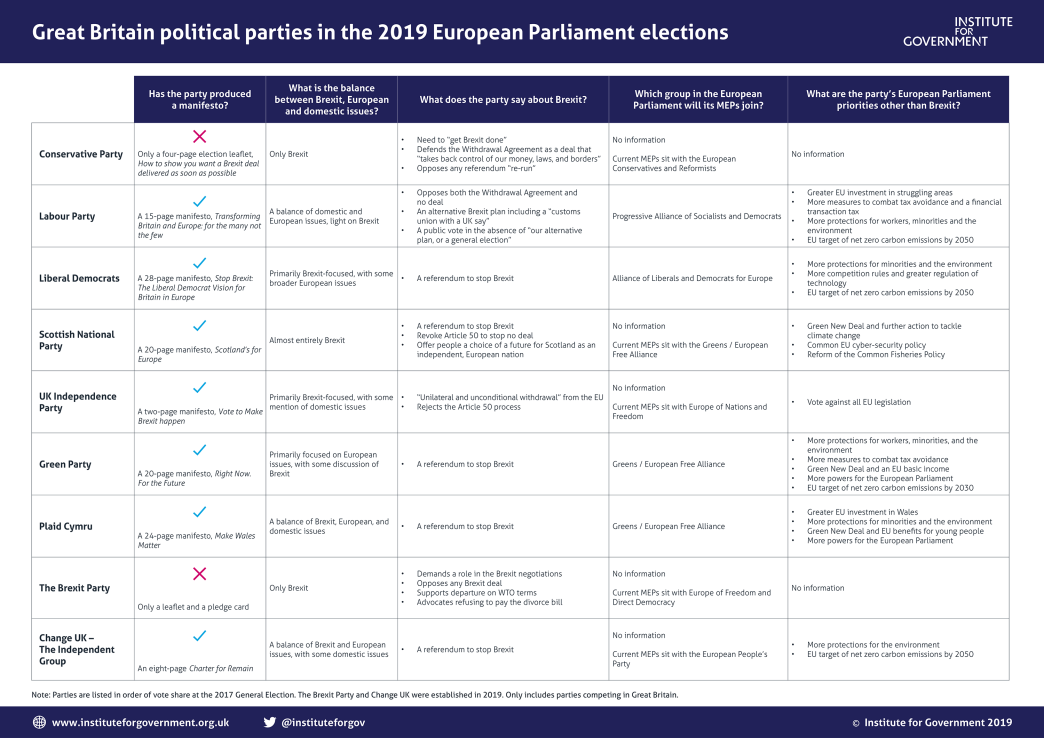Five things to take away from the European election manifestos
The campaign for the European Parliament elections is in full(ish) swing.
The campaign for the European Parliament elections is in full(ish) swing. David Klemperer has been reading the manifestos.
1. Not all parties have produced a full manifesto
The UKIP manifesto is two pages long, the Brexit Party has issued a brief pledge card, and the Conservatives have only produced a leaflet.
For the Conservatives, the absence of a manifesto could suggest an inability agree upon a platform for an election that the majority of its members believe should not be held, or a desire to play down the significance of the contest.
As for the Brexit Party, Nigel Farage has defended the decision not to publish a manifesto by arguing that manifestos are dishonest, and that his party is fighting the election solely on the issue of ‘democracy’. Click here for a run down of the parties' priorities and pledges.
2. The smaller parties are trying to re-run the referendum
The Liberal Democrat manifesto is entitled Stop Brexit, Change UK’s is a Charter for Remain, and the Greens have adopted the slogan ‘No to Brexit. Yes to Europe’. The SNP says a vote for them is a vote for ‘stopping Brexit’, while the first of Plaid Cymru’s pledges is for a ‘final say referendum’.
UKIP’s manifesto, on the other hand, is entitled Vote UKIP to make Brexit happen, while the Brexit Party – the name is the clue – has declared that “We must leave the EU”. By presenting the election as a re-run of the 2016 referendum, the smaller parties are all seeking to capitalise on Parliament’s failure to pass a Brexit deal and the continuing post-referendum divisions.
3. Both the Conservatives and Labour are keeping open their options for a Brexit compromise
The Conservative election leaflet focuses on selling the merits of Theresa May’s Withdrawal Agreement, presenting it as a deal that will “take back control of our borders, money, and laws”. But some Tories are alarmed by the lack of any mention of an independent trade policy and worry that the PM is preparing the ground for a customs union compromise with the Labour Party.
Labour’s manifesto backs a Brexit plan based on a customs union, close single market alignment, and guaranteed rights and standards – and, despite pressure from many Labour MPs and party members, “backs the option of a public vote” only “if we can’t get agreement along the lines of our alternative plan, or a general election”.
The two parties are also attempting to appeal to votes on both sides of the Brexit issue: the Conservative leaflet calls for people to ‘come together’, while the Labour manifesto promises to ‘bring our country back together’ and makes it pitch to electors ‘whether you voted Leave or Remain’. Perhaps unsurprisingly then, the public view Labour and the Conservatives as the parties with the least clear policies on Brexit.
4. The new parties are vague on the detail
Since its launch, Change UK has been criticized for lacking a clear platform. Its eight-page ‘Charter for Remain’ is heavy on ‘values’ but light on substantive policy, while Change UK’s pledges to enforce higher environmental standards and to abolish the European Parliament’s second seat in Strasbourg are also found in the Liberal Democrat manifesto. There is also no mention of which grouping, if any, Change UK MEPs would join in the European Parliament. With no manifesto and no policies at all beyond Brexit, the Brexit Party is even vaguer.
5. Only four parties show much interest in the work of the European Parliament
Labour, the Liberal Democrats, the Green Party, and Plaid Cymru are the only parties to set out what their candidates would do if elected to the European Parliament.
The European Parliament priorities of these four parties have much in common: all propose greater environmental protections and action to tackle climate change, further protections for minority rights, more competition regulation, and more EU public investment. Labour and the Greens both also place substantial emphasis on tackling tax avoidance and extending workers’ rights, while Plaid and the Greens go furthest in calling for greater powers for the European Parliament and a ‘Green New Deal’.
Despite these policy aspirations, the newly-elected MEPs will likely spend until at least October 31 – the date at which the UK is scheduled to leave the EU – focusing on Brexit. Their actions, and behaviour, could yet effect the final outcome.
- Topic
- Brexit
- Keywords
- Withdrawal Agreement
- Country (international)
- European Union
- Publisher
- Institute for Government
